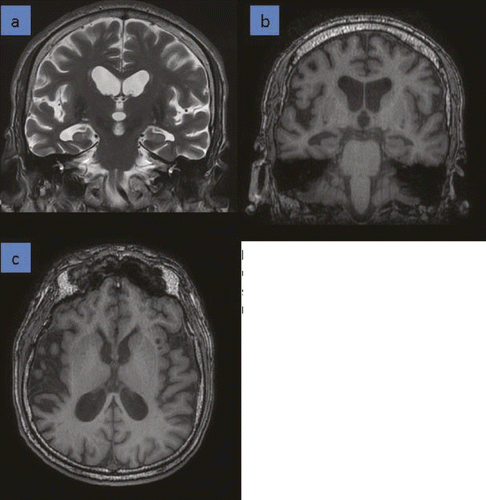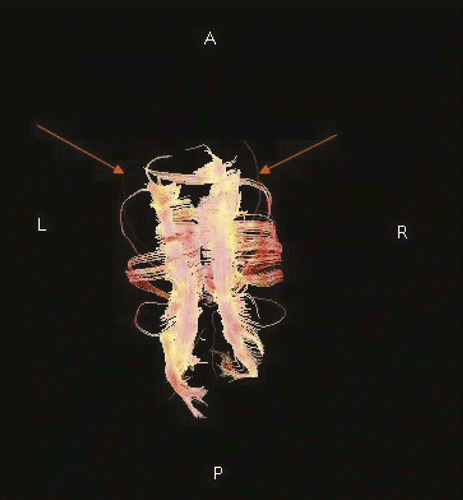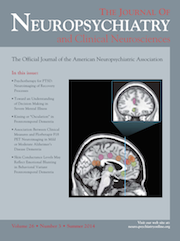At the Interface of Stress, Emotion, and Cognition: A Case With a Diagnostic Challenge
To the Editor: We report on a case with overlapping psychiatric features that posed a diagnostic challenge and motivated us to investigate an underlying relevance between stress, affective symptoms, and dementia onset.
Case Report
A 57-year-old man with a primary school education level who worked in a crafts capacity, married, with two daughters, was admitted to our department complaining of depression and inability to cope with his daily activities. The onset of his symptoms appeared 2 years before his admission, following a labor accident involving his daughter. He exhibited dysthymia and later psychomotor retardation, lack of initiation, and limitation of activities and social contacts. He also complained of loss of energy and self-confidence, and memory decline. The symptoms persisted and gradually worsened, until he was forced to resign from his job. He had visited a clinician and followed an antidepressant treatment; subsequently an acetylcholinesterase inhibitor and N-methyl-D-aspartic acid (NMDA) receptor antagonist were added without clinical improvement. He had no previous medical or psychiatric problems and no family psychiatric history. Informed consent was obtained from the patient and his wife.
He presented well-dressed but with an expressionless face, lack of spontaneous speech, and poor eye contact. Neuropsychological examination revealed impairment of several mental functions: Mini-Mental State Examination (MMSE): 24/30, cognitive section of the Cambridge Examination for Mental Disorders of the Elderly (CAMCOG): 61/107, Frontal Assessment Battery: 6/18, Block Depression Inventory (BDI) normal. Executive functions, attention, concentration, learning, abstract thought and language processing were mostly impaired. EEG showed a generalized retardation of brain rhythm and the MRI ventricle and peripheral subarachnoid space dilation consistent with brain atrophy, more localized on the right temporal and the frontal lobe, two ovoid lesions of the left insular lobe of Reil, and some ischemia throughout the brain (Figure 1). Moreover, diffusion tensor imaging (DTI) imaging revealed a relative bilateral atrophy of the anterior portion of the cingulum (Figure 2).

(254 × 190 mm; 96 × 96 DPI)

(254 × 190 mm; 96 × 96 DPI)
Discussion
We ruled out the initial diagnostic dilemma and came to the conclusion of a diagnosis for mild dementia, excluding pseudodementia. The patient obviously suffered from negative affect as a reaction to the accident and later to his perceived functional decline. However, his responsiveness during the evaluation suggested apathy rather than major depression. Presenile onset, insidious progress, absence of stroke risk factors as well as the clinical features and the findings prompted us to the more likely diagnosis of frontotemporal type of dementia .1,2 The patient is currently attending the outpatient clinic, receiving cognitive rehabilitation sessions, individual and family counseling in a relatively stable clinical condition (slight deterioration of visual-motor coordination and speech production), a year later. He has a supportive, close relationship with his family in contrast to what he had experienced (such as early trauma) during his childhood.
In this case, a stressful event seems to be the catalytic agent, which probably accelerated the clinical manifestation of severe symptomatology. Life events generally precipitate disease onset but a possible link to dementia further involves the associations with stress, emotional responses, and cognitive functions.3–7 Furthermore, early trauma increases predisposition to stress-induced toxicity on brain function.8 A more integrated approach in this research field is needed.
1 : Frontal assessment battery and differential diagnosis of frontotemporal dementia and Alzheimer disease. Arch Neurol 2004; 61:1104–1107Crossref, Medline, Google Scholar
2 : Neuroimaging in dementia. Neurotherapeutics 2011; 8:82–92Crossref, Medline, Google Scholar
3 : Depression and Alzheimer’s disease: is stress the initiating factor in a common neuropathological cascade? J Alzheimers Dis 2011; 23:177–193Crossref, Medline, Google Scholar
4 : Life events and dementia: what is the nature of their relationship? Psychiatry Res 2011; 190:156–158Crossref, Medline, Google Scholar
5 : The effects of stress and stress hormones on human cognition: Implications for the field of brain and cognition. Brain Cogn 2007; 65:209–237Crossref, Medline, Google Scholar
6 : Late-life depression, mild cognitive impairment, and dementia: possible continuum? Am J Geriatr Psychiatry 2010; 18:98–116Crossref, Medline, Google Scholar
7 : Severely stressful events and dementia: a study of an elderly Greek demented population. Psychiatry Res 2010; 176:51–54Crossref, Medline, Google Scholar
8 : [Links between life events, traumatism and dementia; an open study including 565 patients with dementia]. Encephale 2006; 32:746–752Crossref, Medline, Google Scholar



